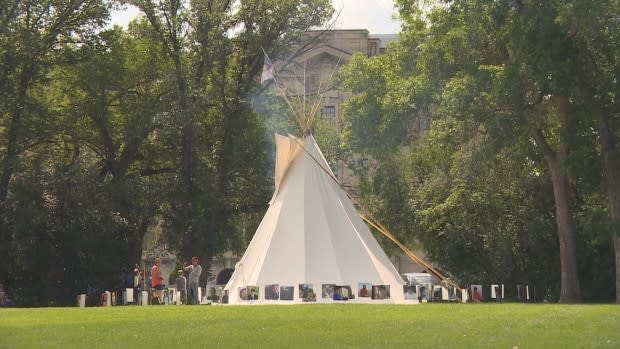Walking With Our Angels camp ordered to come down, stays standing
Regina police have ordered the Walking With Our Angels protest camp set up in Wascana Park to take down the teepee and leave.
Tristen Durocher and Chris Merasty walked 635 kilometers from Air Ronge to Regina in response to the Saskatchewan government denying a suicide prevention bill earlier this month. Durocher is now on a hunger strike until meaningful legislation is passed.
Durocher said he was woken up at 5 a.m. CT this morning at the camp with demands from police to leave the park.
"They came to politely say we're here to enforce the bylaws but we will give you the opportunity to take the teepee down," Durocher said. "What I saw them here for today was not to enforce the bylaws, was not to take that teepee down, but to intimidate us into leaving of our own free will."
He said the police asked him if he would take down the teepee himself, he said he would not and when asked if they could take it down, he said no.
"They knock on the teepee pole maybe [after] ten minutes 'Hello, we would politely like you guys to leave so that we may take this down'," Durocher said. "'Sorry we're a little bit naked right now. We need [to] dress' and they got tired of waiting, they waited less than an hour and they all left."
He said he and the camp are in violation of certain city bylaws in the park. Starting a campfire, staying overnight on the property, erecting a permanent structure and not signing a permit to demonstrate there are all against the bylaws, Durocher said.

Durocher said this isn't the first time cops have come to tell him to leave since he arrived in Regina on Friday.
"They came yesterday to hand me a court summons for a court date set for November and it took them six people in uniform to hand me one piece of paper," Durocher said. "A boy who's sitting cross-legged peacefully sipping a cup of tea."
Raising awareness
The camp has a teepee set up surrounded by dozens of pictures of suicide victims. Durocher said he has permission from the families of those lost to put up their pictures.
"My Facebook page Walking with our Angels did a call for submissions for families to send us photos of their lost loved ones so we could do a portrait gallery and honour them," Durocher said. "And make this country look at them, make those politicians look at them so that they could see these are not just statistics, these are human beings and these are children.
"These are innocent people who for some reason felt so hopeless that they couldn't even believe in tomorrow."

Durocher said his main reason for setting up the camp and going on a hunger strike is to spread public awareness of the suicide epidemic affecting Indigenous communities across the province.
"This province is rich, this country is rich, these politicians and their coffers funded by our public have access to the best experts in Saskatchewan, in Canada and the world," Durocher said. "They could pay for those consultations, the only question is will they and the only question is why haven't they and another question is when will they?
"This affects more than just Indigenous people."
According to the Saskatchewan Coroners Service, 2,338 people have died by suicide from 2005 to 2019 in the province. Twenty-eight per cent of those people were Indigenous. According to Statistics Canada, in 2016 Indigenous people made up 16.3 per cent of the population in Saskatchewan.
Similarities to Justice camp
In February of 2018, a camp was set up in the same place Durocher's camp currently sits.
The Justice For Our Stolen Children camp was set up in response to the non-guilty verdicts of Gerald Stanley and Raymond Cormier, two non-Indigenous men accused of killing two Indigenous youth. Stanley, accused of killing 22-year old Colton Boushie and Cormier, accused of killing 15-year old Tina Fontaine.

The camp stood for nearly 200 days before being taken down after many police interventions and a court order.
Durocher said he expected similar treatment from Regina Police when he decided to set up the protest camp.
"I'm anticipating intimidation, I'm anticipating kind of manipulative [and] scare tactics [like] six men to hand me one piece of paper but I'm not really expecting a forced removal," Durocher said. "That would blow this up bigger than it needs to be."
Durocher said Black Lives Matter protests are in the public eye right now as is the COVID-19 pandemic. He said his protest creates more tension in an already tense society.
"This could be a spark that ignites a blaze that we don't need," Durocher said. "We need to be together, we need to be co-operative."


